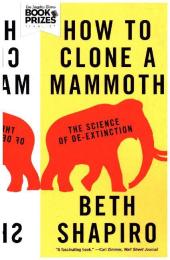 Neuerscheinungen 2016Stand: 2020-02-01 |
Schnellsuche
ISBN/Stichwort/Autor
|
Herderstraße 10
10625 Berlin
Tel.: 030 315 714 16
Fax 030 315 714 14
info@buchspektrum.de |

Beth Shapiro
How to Clone a Mammoth
The Science of De-Extinction. Winner of Los Angeles Times Book Prizes 2016
2016. 240 S. 16 col. ill., 2 b&w ill. 202 mm
Verlag/Jahr: PRINCETON UNIVERSITY PRESS 2016
ISBN: 0-691-17311-7 (0691173117)
Neue ISBN: 978-0-691-17311-5 (9780691173115)
Preis und Lieferzeit: Bitte klicken
Could extinct species, like mammoths and passenger pigeons, be brought back to life? The science says yes. In How to Clone a Mammoth, Beth Shapiro, evolutionary biologist and pioneer in "ancient DNA" research, walks readers through the astonishing and controversial process of de-extinction. From deciding which species should be restored, to sequencing their genomes, to anticipating how revived populations might be overseen in the wild, Shapiro vividly explores the extraordinary cutting-edge science that is being used--today--to resurrect the past. Journeying to far-flung Siberian locales in search of ice age bones and delving into her own research--as well as those of fellow experts such as Svante Paabo, George Church, and Craig Venter--Shapiro considers de-extinction´s practical benefits and ethical challenges. Would de-extinction change the way we live? Is this really cloning? What are the costs and risks? And what is the ultimate goal? Looking at the very real and compelling science behind an idea once seen as science fiction, How to Clone a Mammoth demonstrates how de-extinction will redefine conservation´s future.
"Beth Shapiro . . . has produced a fascinating book. . . . For anyone who wants a thorough understanding of the technical issues involved in de-extinction, How to Clone a Mammoth should satisfy your curiosity."--Carl Zimmer, Wall Street Journal
Beth Shapiro is associate professor of ecology and evolutionary biology at the University of California, Santa Cruz. Her work has appeared in numerous publications, and she received a MacArthur Award in 2009.


